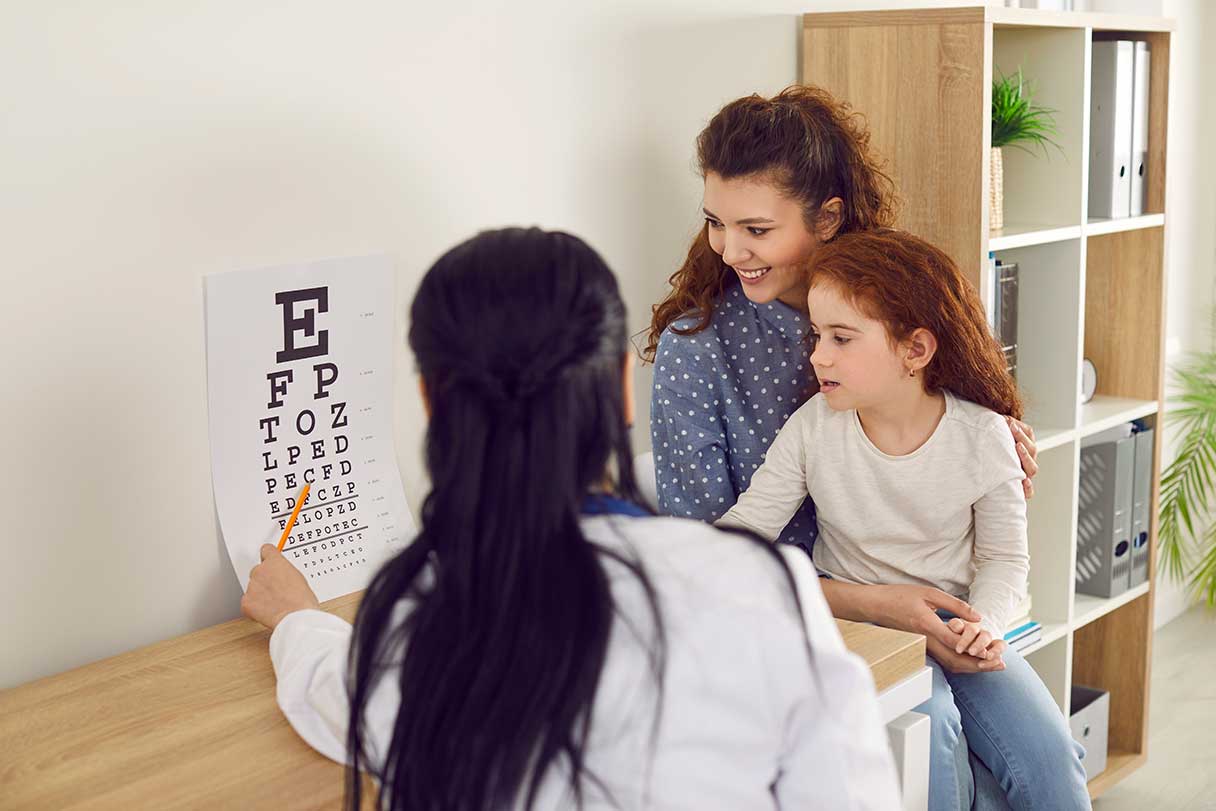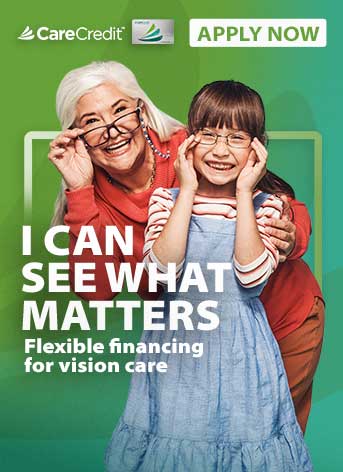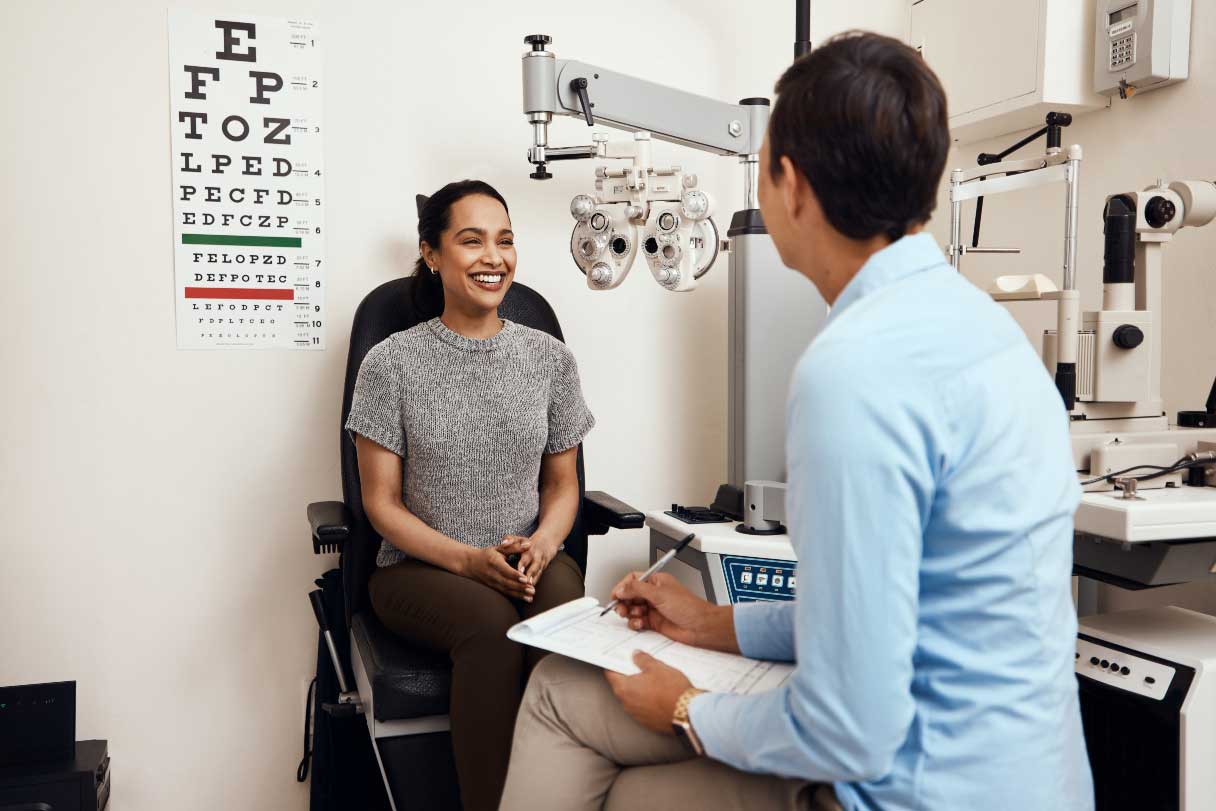Did you know that an eye exam could save your life? According to the American Academy of Ophthalmology, early warning signs of serious health conditions such as high blood pressure, heart disease, multiple sclerosis, diabetes and cancer among others can often be seen in the eyes and detected during a comprehensive eye exam.1 Plus eye exams can diagnose non-life-threatening concerns like vision problems, cataracts or persistent dry eye that can be resolved or improved with the proper treatment.2
Eye changes can happen slowly over time like nearsightedness or quite suddenly like a detached retina.2 Regular eye exams can play an integral role in maintaining healthy eyes and clear vision, but how often should you get your eyes checked?
Why You Should Get an Eye Exam
There are many reasons to consider scheduling a comprehensive eye exam:2
- Checking for changes in your vision
- Learning healthy habits to support your eyesight
- Measurements and tests that may diagnose eye diseases before symptoms arise
- Early warning signs of other health conditions that can be revealed during an eye exam
How Often Should You Get Your Eyes Checked?
Even if you don't have noticeable concerns about your eyes or vision, getting a comprehensive eye exam is important at various points in development from childhood into adulthood.
Eye exams for infants are valuable to ensure proper eye alignment and development.3 In school-aged children, eye exams can diagnose and treat vision concerns like nearsightedness or farsightedness which can impact reading and learning in the classroom.3 For adults, baseline eye exams provide a context to compare later exams to and can help diagnose and treat astigmatism or age-related eye concerns like glaucoma or cataracts as adults age.4
If you have known eye concerns or conditions that impact the eyes like diabetes, you should talk with your healthcare provider to determine how often you should get an eye exam.4 Those who wear glasses or corrective lenses should also plan to see an eye specialist every year to re-evaluate their vision prescription.4
| Newborn | A doctor or health professional will examine a newborn for basic eye health including “red reflex," blink and pupil tests. Premature babies and those with signs of eye disease should consider a full exam with an ophthalmologist.3 |
| Infants (3-12 months) | During well-baby visits, a pediatrician will check for eye health and appropriate development. 3 |
| Children (1-5 years old) | General eye health should continue to be assessed at well-child visits. As soon as a child can read an eye chart, visual acuity should be tested. Schedule an additional eye appointment if you are concerned about misalignment, “lazy eye" or other vision issues. 3 |
| School-aged children (5-18 years) | Currently, 40 states mandate some kind of vision screening for school-aged children though the specifics vary by state. If your state does not require vision screening, be sure to request one for visual acuity and alignment at your well-child visits. 5 |
| Baseline adult eye exam | If you don't have other eye concerns, it is recommended that you have an eye exam once in your 20s and once in your 30s. A baseline exam can be used as comparison for future eye exams.4 |
| 40+ years old | The American Academy of Ophthalmology suggests all individuals get a comprehensive eye exam in their 40s. 4 |
| 65+ years old | If you are 65 or older, the American Academy of Ophthalmology recommends getting your eyes checked every 1-2 years for age-related eye diseases such as cataracts, glaucoma, macular degeneration and others.4 |
When You Should Call Your Doctor
Even if you follow the recommended eye exam guidelines, there are other conditions that may warrant making an immediate appointment with an eye care specialist.
- Vision Impairment: You're having trouble reading, seeing faces or seeing when you drive.4
- Light Sensitivity: You're experiencing pain due to bright light, or bright lights are causing fatigue, dizziness, or other discomforts. 6
- Severe Eye Infection: You have a red, itchy, inflamed cornea or lid or have discharge from the eye.6
- Eye Injury: You have received an impact or scratch injury to the lens, eyelids or surrounding eye area.4
- Persistent Eye Strain: You regularly have blurred vision, eye muscle spasms, headaches and red, irritated eyes. 7
- Double vision: You suddenly see two images of an object. 6
- Flashes or Floaters: You see streaks or flares of light or small specks, circles or lines in your vision. 6
- Persistent Dry Eye: Your eyes are scratchy, red, stinging and sensitive to light.8
- Diabetes diagnosis: You have a new diabetes diagnosis which can damage your eyes over time. 4
- Sudden loss of vision: You're experiencing a sudden inability to see. 6
How to Choose the Right Eye Doctor
When scheduling appointments for your eyes, it is important to consider if you should be seen by an optician, an optometrist or an ophthalmologist. While they all play a valuable role in overall eye health, you may need to see one or the other based on your needs.
Optician
An optician is a specialist who is trained in adjusting and fitting eyeglasses and corrective lenses. They are not trained to offer eye exams, diagnose eye conditions or determine prescriptions.9
Optometrist
Optometrists are healthcare professionals who specialize in vision care. Optometrists are not medical doctors but are trained to test, diagnose and treat vision-related problems such as nearsightedness and farsightedness. They can also prescribe the need for glasses or corrective lenses. 9
Ophthalmologist
An ophthalmologist is a medical doctor who specializes in eye health. Ophthalmologists usually have 12 to 14 years of medical training and are licensed to both practice medicine and perform surgical procedures. Some ophthalmologists may have specialized training in specific eye concerns such as glaucoma, retinas or children.9
In addition to eye exams and prescriptions, an ophthalmologist can be seen for a wider variety of eye-related concerns than an optometrist or optician including diagnosing and treating eye diseases and eye surgery.9
What to Expect During an Eye Exam
A comprehensive eye exam normally takes between 45 to 90 minutes.4 During that time, the medical professional will ask you about your family medical history, eye health, current medications and use of contact lenses or glasses. The specialist will also perform a number of tests to check and measure various aspects of the eye. During most comprehensive eye exams, dilating drops may be administered for the specialist to check the retina and optic nerve.4
A comprehensive eye exam may include a combination of eye tests and measurements:4
- An eye chart to check visual acuity
- Pupil evaluation
- Peripheral vision evaluation
- Eye movement and alignment checks
- Eye pressure measurements
- Front of your eye evaluation including the eyelids, cornea, iris and lens
- Back of eye evaluation including the retina and optic nerve
In some cases, the ophthalmologist may recommend additional, specialty eye tests such as an optical coherence tomography, fundus photos or fluorescein angiography if needed.4
Cost of Eye Exams
Some basic vision tests may be included as part of a well-child or annual physical examination.
For a comprehensive eye exam, patients can expect to pay an average of $114.10 This cost can vary based on geographic area, patient age and the particular eye specialist. Some providers may require an initial new patient visit which may cost more than a regular exam.11 Other discount clinics may offer eye exams for around $50.10
If you get diagnosed with nearsightedness or farsightedness, some eye exam providers may charge a separate fee for refraction, a test that calculates an individual's specific prescription for glasses or corrective lenses.10
How to Pay for Eye Exams
Wondering how to pay for an eye exam? If you have medical insurance, many policies cover comprehensive eye exams and medical treatment of eye issues at an ophthalmologist. Vision insurance, on the other hand, covers eye exams in addition to glasses and corrective lenses.12
If your policy doesn't include eye exams, you can pay out-of-pocket or consider applying for a CareCredit credit card* to help finance the cost of eye exams and any needed treatments.
CareCredit Financing for Eye Exams
Regular eye exams are an important part of your eye health. Whether you're getting an eye exam or needing eye surgery, the CareCredit credit card can help you pay for care where your insurance leaves off.* Apply today and use our Acceptance Locator to find a vision specialist near you that accepts CareCredit. Continue your wellness journey by downloading the CareCredit Mobile App to manage your account, find a provider on the go, and easily access the Well U hub for more great articles, podcasts, and videos.
Author Bio
Kate Bayless is a health and wellness freelance writer with 15 years of experience. Her work has appeared in Parents, Women's Health, Beachbody, and OpenFit.








